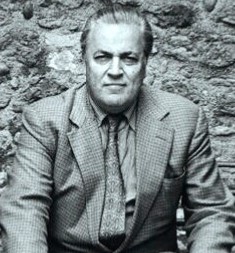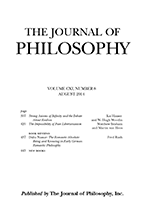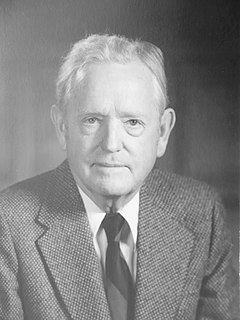Related Research Articles

John Dewey was an American philosopher, psychologist, and educational reformer whose ideas have been influential in education and social reform. He was one of the most prominent American scholars in the first half of the twentieth century.

Metaphysics is the branch of philosophy that studies the first principles of being, identity and change, space and time, causality, necessity and possibility. It includes questions about the nature of consciousness and the relationship between mind and matter. The word "metaphysics" comes from two Greek words that, together, literally mean "after or behind or among [the study of] the natural". It has been suggested that the term might have been coined by a first century CE editor who assembled various small selections of Aristotle’s works into the treatise we now know by the name Metaphysics.

Pragmatism is a philosophical tradition that considers words and thought as tools and instruments for prediction, problem solving, and action, and rejects the idea that the function of thought is to describe, represent, or mirror reality. Pragmatists contend that most philosophical topics—such as the nature of knowledge, language, concepts, meaning, belief, and science—are all best viewed in terms of their practical uses and successes.

Thomas Hill Green, known as T. H. Green, was an English philosopher, political radical and temperance reformer, and a member of the British idealism movement. Like all the British idealists, Green was influenced by the metaphysical historicism of G. W. F. Hegel. He was one of the thinkers behind the philosophy of social liberalism.

John Henry McDowell is a South African philosopher, formerly a Fellow of University College, Oxford and now University Professor at the University of Pittsburgh. Although he has written on metaphysics, epistemology, ancient philosophy, and meta-ethics, McDowell's most influential work has been in the philosophy of mind and philosophy of language. McDowell was one of three recipients of the 2010 Andrew W. Mellon Foundation's Distinguished Achievement Award, and is a Fellow of both the American Academy of Arts & Sciences and the British Academy.
Percy Brand Blanshard was an American philosopher known primarily for his defense of reason and rationalism. A powerful polemicist, by all accounts he comported himself with courtesy and grace in philosophical controversies and exemplified the "rational temper" he advocated.

Jacques Maritain was a French Catholic philosopher. Raised Protestant, he was agnostic before converting to Catholicism in 1906. An author of more than 60 books, he helped to revive Thomas Aquinas for modern times, and was influential in the development and drafting of the Universal Declaration of Human Rights. Pope Paul VI presented his "Message to Men of Thought and of Science" at the close of Vatican II to Maritain, his long-time friend and mentor. The same pope had seriously considered making him a lay cardinal, but Maritain rejected it. Maritain's interest and works spanned many aspects of philosophy, including aesthetics, political theory, philosophy of science, metaphysics, the nature of education, liturgy and ecclesiology.
In moral philosophy, instrumental and intrinsic value are the distinction between what is a means to an end and what is as an end in itself. Things are deemed to have instrumental value if they help one achieve a particular end; intrinsic values, by contrast, are understood to be desirable in and of themselves. A tool or appliance, such as a hammer or washing machine, has instrumental value because it helps you pound in a nail or cleans your clothes. Happiness and pleasure are typically considered to have intrinsic value insofar as asking why someone would want them makes little sense: they are desirable for their own sake irrespective of their possible instrumental value. The classic names instrumental and intrinsic were coined by sociologist Max Weber, who spent years studying good meanings people assigned to their actions and beliefs.
Philosophical realism is usually not treated as a position of its own but as a stance towards other subject matters. Realism about a certain kind of thing is the thesis that this kind of thing has mind-independent existence, i.e. that it is not just a mere appearance in the eye of the beholder. This includes a number of positions within epistemology and metaphysics which express that a given thing instead exists independently of knowledge, thought, or understanding. This can apply to items such as the physical world, the past and future, other minds, and the self, though may also apply less directly to things such as universals, mathematical truths, moral truths, and thought itself. However, realism may also include various positions which instead reject metaphysical treatments of reality entirely.

Anthony Meredith Quinton, Baron Quinton, FBA was a British political and moral philosopher, metaphysician, and materialist philosopher of mind.
John Laird was a philosopher, in the school of New British Realism, who later turned to metaphysical idealism.
The following outline is provided as an overview of and topical guide to philosophy:

The Journal of Philosophy is a monthly peer-reviewed academic journal on philosophy, founded in 1904 at Columbia University. Its stated purpose is "To publish philosophical articles of current interest and encourage the interchange of ideas, especially the exploration of the borderline between philosophy and other disciplines." Subscriptions and online access are managed by the Philosophy Documentation Center.

Philosophy is the study of general and fundamental questions, such as those about existence, reason, knowledge, values, mind, and language. Such questions are often posed as problems to be studied or resolved. Some sources claim the term was coined by Pythagoras ; others dispute this story, arguing that Pythagoreans merely claimed use of a preexisting term. Philosophical methods include questioning, critical discussion, rational argument, and systematic presentation.
The following outline is provided as an overview of and topical guide to metaphysics:
The Howison Lectures in Philosophy are a lecture series established in 1919 by friends and former students of George Howison, who served as the Mills Professor of Intellectual and Moral Philosophy and Civil Polity at the University of California, Berkeley.
Professor Howison held the reasoned conviction that this world to its very depth is kindred to the human spirit; that it is a community of free persons, finite and infinite, sustained by the vision of the Perfect; and all his great powers were directed to awaken in others a loyalty to these ideas. And those, it would seem, would most speak from a foundation in his memory who were able to share with him this high purpose and conviction.

American philosophy is the activity, corpus, and tradition of philosophers affiliated with the United States. The Internet Encyclopedia of Philosophy notes that while it lacks a "core of defining features, American Philosophy can nevertheless be seen as both reflecting and shaping collective American identity over the history of the nation."
This is a list of philosophical literature articles.

Donald Cary Williams, usually cited as D. C. Williams, was an American philosopher and a professor at both the University of California Los Angeles and at Harvard University.
References
- ↑ O'Brien, Ken (October 23, 1994). Roots of Carus Corp. reach back to Germany. Chicago Tribune
- ↑ Alexander Hartley Burr. Introduction. In Dewey, John (1925) Experience and Nature. Kessinger Publishing, reprint 2003, ISBN 978-0-7661-7320-0